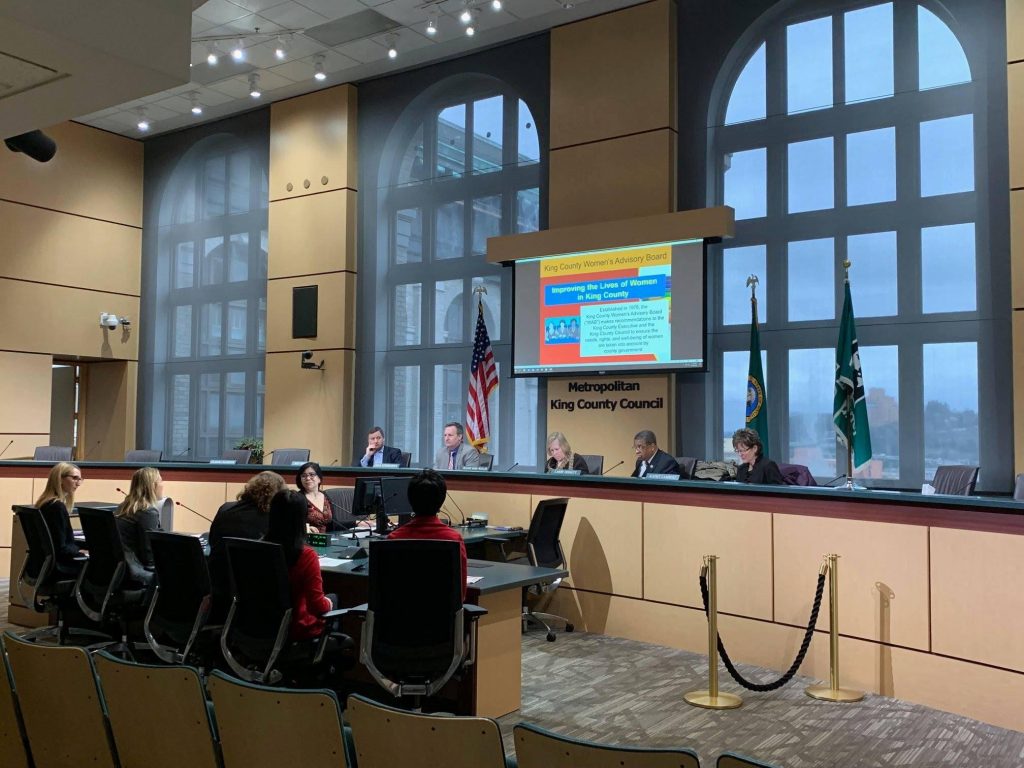Before, during, and after the pandemic I have been a public transit rider and advocate. I started taking Metro as a teenager to get from Queen Anne to high school in the Central District and now commute with my son to his daycare and my job in downtown Seattle. To me—like so many King County residents—the bus has always meant mobility and freedom—to get to school, to work, to local businesses, and to the great destinations our county has to offer. In addition to being a rider, I am a longtime transit advocate. While serving as President of the UW Graduate and Professional Student Senate at UW Law, concerned that the UW’s U-Pass was threatened because of declining revenue, I worked with fellow student leaders to advocate for and win a universal U-pass to save the program. Most recently, I helped to mobilize community members and Democrats to urge their policymakers to support local and state transit investments.

Presenting the GPSS/ASUW proposal universal U-Pass proposal to the Board of Regents.
The King County Council has an important role in delivering safe, reliable, and equitable public transit to the region. As your King Council Councilmember, I will work to create a world-class public transit system where every community member has access to reliable, affordable, fast, and safe transit options. While King County has led in delivering public transit options, our current system does not ensure that all our neighbors have access to fast, reliable, affordable public transit and the impact of the pandemic has left the County with work to do to help Metro Transit recover. In King County and in the 4th Council District, lack of transportation and transportation costs disproportionately impact communities of color, disabled people, youth, and those with fixed incomes. As your King County Councilmember, I will work to elevate community voices and particularly those disproportionately impacted by bus deserts and lack of access to transit options to further mobility access and justice. Together we can deliver on the following priorities:
- Improve Metro bus access, reliability, speed, and safety. Restore and increase service hours, availability, and routes through the 4th Council District and speed up the transition to zero-emission buses. Build a coalition to pass a countywide measure to fully implement Metro Connects to deliver faster, reliable, and accessible bus service that connects every community member to the regional transit system and helps to build a workforce of bus operators, mechanics and other staff. Work with our partners in the labor community to direct funding to more and better incentives to hire and retain the staff who make Metro possible.
- Deliver light rail to Ballard and equitable transit-oriented development. As our region is growing rapidly, work to ensure that light rail to Ballard is delivered on time, connects to existing transit, and fully utilizes opportunities for transit-oriented development in a way that creates additional affordable housing and connects our communities.
- Fully implement an income-based fare structure to ensure that everyone can ride transit. King County recently implemented a zero-fare policy for youth so that now all youth can ride transit for free. King County should build on this program by fully adopting an income-based fare system that includes a transit pass program for all our neighbors that cannot afford to ride.
- Create a program to require larger employers and provide incentives for medium and smaller workers to subsidize transit passes for all their workers modeled after the Transit Riders Union’s ORCA for all campaign. Currently, higher wage earners are more likely to receive subsidized transit passes than lower wage workers who are more cost burdened, have longer commutes, and are disproportionately women and BIPOC. King County should build off the success of existing programs and design programs to put fully subsidized transit passes in the hands of the workers who need them most.
- Work towards truly restorative enforcement policies. King County has taken big steps to move away from punitive and towards restorative fare enforcement, but we must continue to work with Sound Transit and other agencies to move towards just and equitable fare enforcement.






